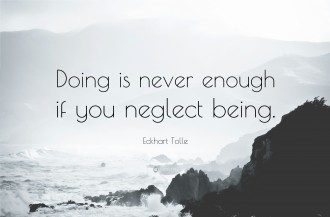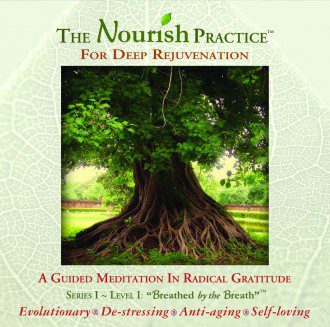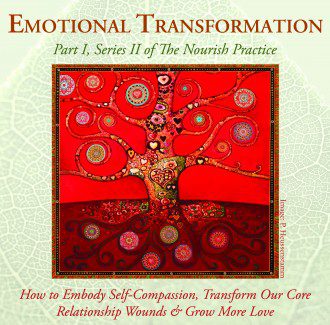Contributing Writer for Wake Up World
The feeling that we are not enough is often a throwback to childhood. No matter how much we tell ourselves that we are enough, it is not going change much how we feel about ourselves as adults. The cure to this bedeviling feeling is to go back and do the healing work from childhood, for the love we did not get. This was the unconditional acceptance of our beingness into the world nourished by the grounded forces of caring, respect, and honor that allowed to us to feel whole, and enough.
As adults, we carry our childhood inside us. Yet, many confuse insufficient feelings from childhood with the adult experience of being enough, as if to be enough as an adult is not to have to show up for anything and just be, or at least not have to show up more than we did as children. As adults, we are rewarded and recognized more for what we contribute to others and to the world, for our responsibility and generosity to the whole. In other words, as adults the bulk of our worth and enoughness is not just for being alive, but for what we contribute to others, for giving.
Unconditional acceptance of ourselves as adults depends on having an authentic sense of self formed during childhood. As a result, we feel deep inside that we are enough. Yet, most of us don’t get this attuned mirroring during childhood, so healing relationships during adulthood, as well as grief work for what we didn’t get, help to give us what we lost.
But, just because we carry this sense, or ground, of enoughness does not mean that this is fulfilling as an adult, for such comfort and appeasement are not the end-all the terrain of adulthood, as it was in infancy. For most of us, ultimately it’s not enough to do nothing, and just be, as adults. As part of healing childhood not-enoughness, we might transitionally practice just being by touching into childhood wounds and embodying a sense of unconditional love so that we can establish that foundation of acceptance for ourselves. Neither do we need to be too concerned about being lazy adults if we possess a core feeling of being enough, for one who knows and embodies this love-filled enoughness will usually be inspired to contribute his gifts of service.
Enoughness as an adult, then, seems a paradoxical dance. We possess both a feeling of being enough and not being enough. We are enough and simultaneously never enough, for there is never enough we can do to serve the world as much our hearts and soul want to. This is an existential longing for wholeness, for completion, which is never finally fulfilled, except in the radical, paradoxical acceptance that it is enough that we are never enough.
Paradoxically, when we do feel that we are enough deep inside, in our child and formative sense of self, as adults we never feel enough, for the love as wide as the world we found either in childhood or through our healing work as adults, can never give enough of itself to that world, for the glory, the greatness it found.
In sum, if you feel not enough, consider how much is from childhood and how much from adulthood. Are you not living up to your adult potential, that paradoxical sense of enoughness that is quickly replaced by the deep desire to do more? If so, then no manner of childhood wound healing will give you the sense of adult completion, of enoughness. Or, is your not-enoughness a deep, childhood wound? If it is, then no matter of achievement in the world will heal this feeling of deficiency. In the end, as adults, we are wholly enough when we have both worked with and accepted our love deficit wounds from childhood and are contributing passionately towards the healing of others.
In our greatness, let us not forget the humble beginnings that made us great. True greatness has at its core a humility, such that our greatness is ultimately of service, to help others find the love and goodness we found in the depths of our being, often recovered through great pain and struggle.
In contrast, greatness that always needs to puff itself up for the sake of puffing, not for healing or giving, is a mark of the false self. This is someone who likely has not embodied his childhood sense of being enough just for being so. The false puff is a compensation for a lack of real inner stuff.
It’s tricky, because in today’s world many valuable and humble people have to make themselves seem great in order to be heard. But it would be a mistake to confuse their public persona with their core, with their heart, especially if you don’t know them. And, it would be even more tragic for them to confuse their external greatness and persona with their truer self. If they are truly great, ultimately they won’t get caught up in their self-image.
Feeling enough, then, is a combination of core self-worth and adult contribution to the world. As adults, when we both heal our childhood love deficits and find our calling to make a difference according to our unique sense of belonging in the world as adults, we stand the best chance for fulfillment, of being enough.
The Nourish Practice
Jack Adam Weber’s “The Nourish Practice” is an easy, guided meditation-Qi Gong practice in radical gratitude and self-love. It is an Earth-based, body-centered practice — at once physiological and mythological — that is deeply relaxing and replenishing, especially for modern-day burn-out syndrome, and requires little physical effort. “The Nourish Practice” resets your nervous system and fosters a rich inner life.
You can purchase The Nourish Practice as a CD or Digital Download here.
PLUS: The first installment in Jack Adam Weber’s new “Emotional Transformation” series, entitled “Healing from Heartbreak”, is available now!
Previous articles by Jack Adam Weber:
- The Modern Shaman: Fierce Love at the Frontier of Madness
- When We Love an Addict – Courage and the Limits of Compassion
- Arrogance in Relationships: How to Deal With and Heal It
- 11 Reasons Why Hippies (Not Psychos) Should Rule the World
- The Monsanto Years: Singer Neil Young Rips Into GMOs, Big Biz and Conformity
- ReVOLUTION: When Enough is Enough
- Sex – Truth and Dare, Pleasure and Purpose
- Relationships: The Costs of Staying When We Should Leave
- Yin Yang — Ancient Wisdom for Personal and Planetary Transformation
- Heartbreak – Loving Ourselves Through Difficult Times
- Sacred Space – What Is It and Why Do We Need It?
About the author:
 Jack Adam Weber, L.Ac. is a Chinese medicine physician, author, celebrated poet, organic farmer, and activist for body-centered spirituality. He is also the creator of The Nourish Practice, an Earth-based rejuvenation meditation. Weber is available by phone for medical consultations and life-coaching.
Jack Adam Weber, L.Ac. is a Chinese medicine physician, author, celebrated poet, organic farmer, and activist for body-centered spirituality. He is also the creator of The Nourish Practice, an Earth-based rejuvenation meditation. Weber is available by phone for medical consultations and life-coaching.
You can connect with Jack at:
- Website: JackAdamWeber.com
- Facebook: Facebook.com/JackAdamWeber
- Twitter: Twitter.com/JackAdamWeber
- Email: [email protected]

If you've found value in our articles, we invite you to support the release of our brand-new book, "Gratitude Practices for Kids: A Practical Guide for Adults to Instill a Spirit of Appreciation and Positivity in the Next Generation."
"Gratitude Practices for Kids" brings together over 25 innovative and accessible practices designed to enhance gratitude in everyday life. This comprehensive guide is backed by 17 scientific studies, ensuring each concept is grounded in research, underscoring our commitment to nurturing growth, emotional intelligence, and positive interactions between adults and children.
We encourage you to opt for the paperback version to celebrate this new release. Dive into its fresh pages away from digital distractions, allowing you to immerse yourself in the transformative practices it offers.
Over recent years, Wake Up World has faced significant online censorship, which has impacted our financial ability to operate. Moving into book publishing represents a strategic step to secure the ongoing funds needed to continue our mission. By purchasing Gratitude for Kids, you help us keep our content free and accessible to everyone, avoiding needing a paywall. With over 8,500 articles published in the last 13 years, we remain dedicated to keeping our valuable content open to all.










